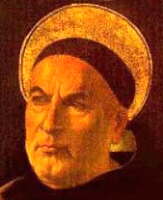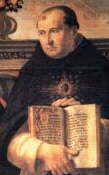Thomas Aquinas (1224-1274)

The most profoundly influential of all the medieval philosophers was the Dominican Thomas Aquinas, whose brilliant efforts in defense of Christian theology earned him a reputation as “the angelic teacher.” His willingness to employ rational argumentation generally and the metaphysical and epistemological teachings of Aristotle in particular marked a significant departure from the neoplatonic/Augustinian tradition that had dominated so much of the middle ages. Aquinas showed the church that it was possible to incorporate many of the “new” teachings of “the Philosopher” (Aristotle) without falling into the mistaken excesses of “the Commentator” (Ibn Rushd), and this became the basis for a lasting synthesis.
Born to an aristocratic family living in Roccasecca, Italy, Thomas Aquinas joined the Dominican order while studying philosophy and theology at Naples. Later he pursued additional studies in Paris and Köln, where he was exposed to Aristotelean thought by Albert the Great and William of Moerbeke. During the rest of his life, he taught at Paris and Rome, writing millions of words on philosophical and theological issues and earning his reputation among the scholastics as “the angelic doctor.” Aquinas developed in massive detail a synthesis of Christianity and Aristotelian philosophy that became the official doctrine of Roman Catholic theology in 1879. DE ENTE ET ESSENTIA (ON BEING AND ESSENCE) includes a basic statement of Aquinas’s metaphysical position. His literary activity stopped abruptly as the result of a religious experience a few months before his death.
Although he wrote many commentaries on the works of Aristotle and a comprehensive SUMMA DE VERITATE CATHOLICAE FIDEI CONTRA GENTILES (SUMMA CONTRA GENTILES) (1259-1264), Aquinas’s unfinished SUMMA THEOLOGICA (1265-1273) represents the most complete statement of his philosophical system. The sections of greatest interest for survey courses include his views on the nature of god, including the five ways to prove god’s existence, and his exposition of natural law.

Although matters of such importance should be accepted on the basis of divine revelation alone, Aquinas held, it is at least possible (and perhaps even desirable) in some circumstances to achieve genuine knowledge of them by means of the rigorous application of human reason. As embodied souls (hylomorphic composites), human beings naturally rely on sensory information for their knowledge of the world.
Reading hint: Although the rigidly formal structure of the Summa articles can be rather confusing to a modern reader, the central portion beginning with the words, “I answer that…” is always a direct statement of Aquinas’s own position.
Aquinas: Christian Aristotelianism
For Aquinas, theology is a science in which careful application of reason will yield the demonstrative certainty of theoretical knowledge. Of course it is possible to accept religious teachings from revealed sources by faith alone, and Aquinas granted that this always remains the most widely accessible route to Christian orthodoxy. But for those whose capacity to reason is well-developed, it is always better to establish the most fundamental principles on the use of reason. Even though simple faith is enough to satisfy most people, for example, Aquinas believed it possible, appropriate, and desirable to demonstrate the existence of god by rational means.
Five Ways to Prove God’s Existence
Anselm‘s Ontological Argument is not acceptable, Aquinas argued, since we are in fact ignorant of the divine essence from which it is presumed to begin. We cannot hope to demonstrate the necessary existence of a being whose true nature we cannot even conceive by direct or positive means. Instead, Aquinas held, we must begin with the sensory experiences we do understand and reason upward from them to their origin in something eternal. In this vein, Aquinas presented his own “Five Ways” to prove the existence of god.
The first three of these ways are all variations of the Cosmological Argument. The first way is an argument from motion, derived fairly directly from Aristotle’s Metaphysics:
- There is something moving.
- Everything that moves is put into motion by something else.
- But this series of antecedent movers cannot reach back infinitely.
- Therefore, there must be a first mover (which is god).
The first premise is firmly rooted in sensory experience, and the second is based on accepted notions about potentiality and actuality. In defence of the third, Aquinas noted that if the series were infinite then there would be no first, and hence no second, or third, etc. The second way has the same structure, but begins from experience of an instance of efficient causation, and the third way relies more heavily upon a distinction between contingent and necessary being. In all of its forms, the Cosmological Argument is open to serious challenge. Notice that if the second premise is wholly and literally true, then the conclusion must be false. If, on the other hand, it is possible for something to move without being put into motion by another, then why might there not be hundreds of “first movers” instead of only one? Besides, it is by no means obvious that the Aristotelian notions of a “first mover” or “first cause” bear much resemblance to the god of Christianity. So even if the argument succeeded it might be of little use in defence of orthodox religion.
Aquinas’s fourth way is a variety of Moral Argument. It begins with the factual claim that we do make judgments about the relative perfection of ordinary things. But the capacity to do so, Aquinas argued, presupposes an absolute standard of perfection to which we compare everything else. This argument relies more heavily on Platonic and Augustinian notions, and has the advantage of defending the existence of god as moral exemplar rather than as abstract intitiator of reality.
The fifth way is the Teleological Argument: the order and arrangement of the natural world (not merely its existence) bespeaks the deliberate design of an intelligent creator. Although it is an argument by analogy which can at best offer only probable reason for believing the truth of its conclusion, this proof offers a concept of god that most fully corresponds to the traditional elements of medieval Christian theology. Since its empirical basis lies in our understanding of the operation of nature, this line of reasoning tends to become more compelling the more thorough our scientific knowledge is advanced.
- Read: “St. Thomas Aquinas: “The Existence of God Can Be Proved in Five Ways” (Theodore Gracyk) for the logic behind the each of the “Five Ways”
The Created World
Since the nature of god can be known only analogically by reference to the created world, Aquinas believed it worthwhile to devote great attention to the operation of nature. Here, of course, the basic approach is that of Aristotle, but the commentaries of Ibn Rushd provide a reliable guide as well.
Although we cannot rationally eliminate the possibility that matter itself is co-eternal with god, Aquinas held, that undifferentiated prime matter can be nothing but pure potentiality in any case. It is only through god’s bestowal of a substantial essence upon some portion of prime matter that a real material thing comes into existence. Thus, everything is, in some sense, a hylomorphic composite of matter and form for Aquinas, and god is the creator of all. But, of course, human beings are a special case. As Aristotle had supposed, the human soul is the formal, efficient, and final cause of the human body. But in this one special instance, Aquinas held that god can add existence directly, without any admixture of prime matter, thus making possible the immortality of disembodied human souls.
Even in this life, Aquinas argued, the intellect is a higher faculty than the will in virtue of its greater degree of independence from the body. As the agent of knowledge, the human intellect comprehends the essences of things directly, making use of sensory information only as the starting-point for its fundamentally rational determinations. Although not all of Aquinas’s contemporaries recognized, understood, or accepted this view of human knowledge, it provided ample room for the development of empirical investigations of the material world within the context of traditional Christian doctrine.
Legacy
Thomas Aquinas was canonized a saint in 1323, officially named doctor of the church in 1567, and proclaimed the protagonist of orthodoxy during the modernist crisis at the end of the 19th century. This continuous commendation, however, cannot obliterate the historical difficulties in which he was embroiled in the 13th century during a radical theological renewal—a renewal that was contested at the time and yet was brought about by the social, cultural, and religious evolution of the West. Thomas was at the heart of the doctrinal crisis that confronted Christendom when the discovery of Greek science, culture, and thought seemed about to crush it. William of Tocco, Aquinas’s first biographer, who had known him and was able to give evidence of the impression produced by his master’s teaching, says:
Brother Thomas raised new problems in his teaching, invented a new method, used new systems of proof. To hear him teach a new doctrine, with new arguments, one could not doubt that God, by the irradiation of this new light and by the novelty of this inspiration, gave him the power to teach, by the spoken and written word, new opinions and new knowledge.
Candela Citations
- Thomas Aquinas. Authored by: Garth Kemerling. Provided by: The Philosophy Pages. Located at: http://www.philosophypages.com/ph/aqui.htm. License: CC BY-SA: Attribution-ShareAlike
- Bonaventure and Aquinas. Authored by: Garth Kemerling. Located at: http://www.philosophypages.com/hy/3n.htm. License: CC BY-SA: Attribution-ShareAlike
- St. Thomas Aquinas. Authored by: Marie-Dominique Chenu. Provided by: Encyclopedia Britannica, Inc.. Located at: https://www.britannica.com/biography/Saint-Thomas-Aquinas. License: All Rights Reserved
